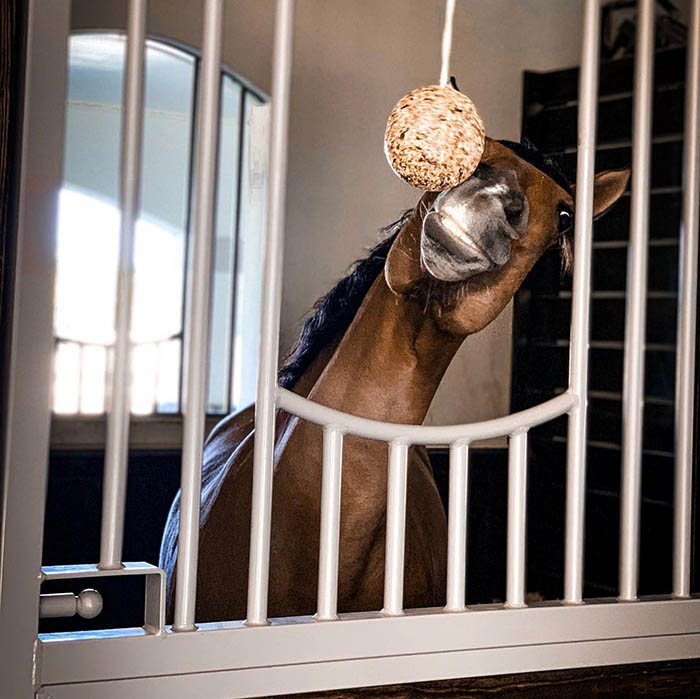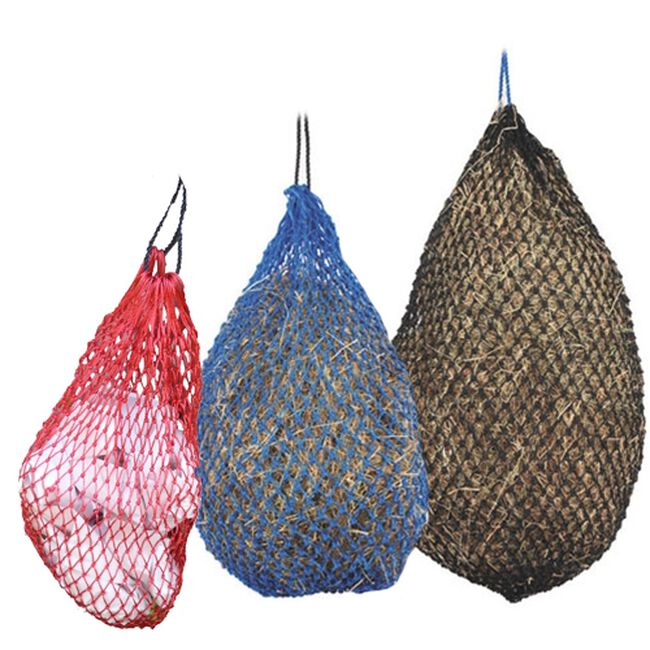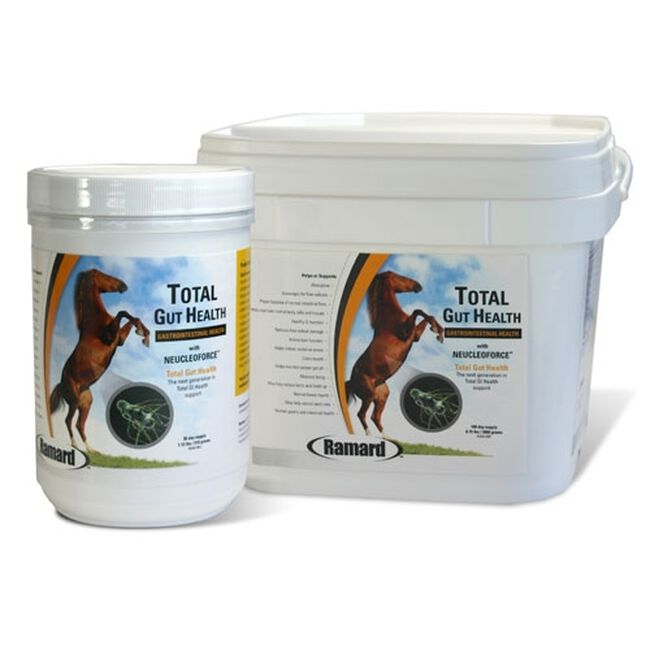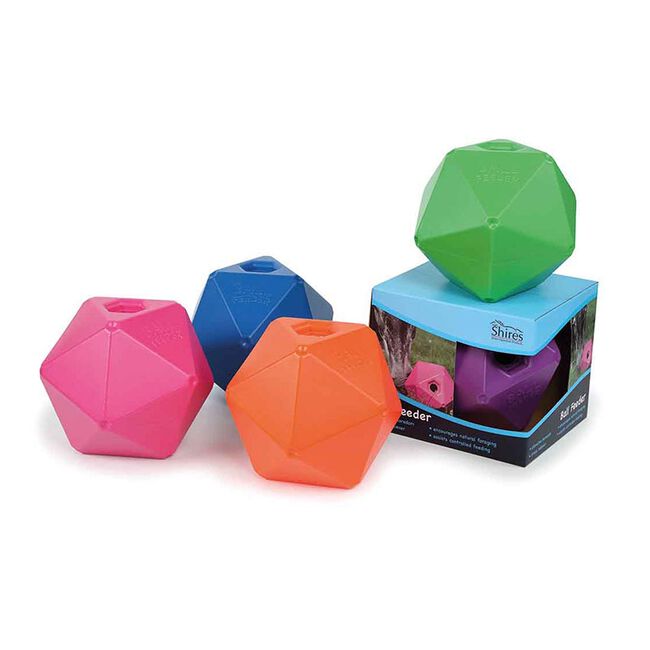
Sometimes, despite our best intentions, our horses are relegated to stall rest, whether it be because of an injury or as a post-surgical precaution. While simple in theory, managing a horse on stall rest can be a difficult task, Dr. Jessica Werner of Vermont/New Hampshire Vet Clinic in East Dummerston, VT, says, “In general, I worry about a couple of things during extended periods of stall rest: keeping your horse occupied mentally, and dealing with and trying to prevent the potential health concerns.” In this blog, we talk to Dr. Werner to further understand some of the complications which could present whenever you have a horse on stall rest.
First and foremost, it is important that you monitor your horse’s digestive health, as this can often show preliminary signs of trouble. “Horses do not always respond well to sudden changes, so any time you make changes to their routine it is always a good idea to keep tabs on normal inputs and outputs,” explains Dr. Werner. “You will want to monitor your horse’s manure, water intake, and urine output to make sure they are consistent. A normal horse, consuming a normal amount of feed, passes between 8-12 piles of manure a day. Fecal balls should be formed but should be easy to break apart.”
In order to accommodate your horse’s decrease in activity, you will want to also lower their caloric intake. For many horses, this means cutting down on the amount of grain that they are receiving while at the same time increasing their forage intake to ensure that their digestive system is constantly working (it also provides mental stimulation). Look for mature grass hay, which will have fewer calories than alfalfa-based hays. If your horse tends to eat their hay quickly, consider utilizing a slow feeder hay net, like the Shires Greedy Feeder Hay Net or the Hay Chix Free Up Feeder, which slows down your horse’s rate of consumption. Ideally, a horse on stall rest will always have hay in front of them.

Shires Greedy Feeder Hay Net
The small holes in this hay net let the hay out slowly, making your horse work harder as they eat.
Horses thrive on routine—and when this routine is rapidly changed, many horses experience digestional distress. “It is generally a good idea to add some gastric support to a horse on stall rest, as this can be stressful,” Dr. Werner comments. “Gastric support comes in many forms and can be discussed with your veterinarian.” To minimize the occurrence of ulcers, colic, or diarrhea, we recommend putting your horse on a digestive supplement to support their digestive health through their stall rest journey (feeding additional forage will also optimize digestive health). Digestive supplements can work in a variety of ways, but generally, they support the horse foregut and hindgut while utilizing ingredients to keep foodstuffs traveling through the digestive tract. For example, Ramard Total Gut Health supports the growth of intestinal microflora for optimal gut health and immune function, while Animed PurePsyll Powder lubricates the digestive tract and aids in the removal of dust and sand from your horse’s system (which may cause sand colic if left untreated).
Ramard Total Gut Health
This comprehensive gastrointestinal product supports the entire GI tract in addition to issues that can be caused by poor absorption.
Because your horse will be spending more time inside than normal, proper ventilation of the barn is even more important than ever. This will help to minimize dust and noxious gases, such as ammonia, which may harm your horse’s respiratory system. If you begin to smell the distinct scent of ammonia, we recommend using a stall deodorizing product, like Stall Dry Deodorizer, to effectively neutralize the harmful gases and protect your horse’s respiratory health.
Your horse may also need additional bedding to absorb the increase in urine and manure over the course of the day; this will also make their stall more comfortable, a must if they are rehabbing from an injury. Consider utilizing rubber mats to give your horse additional cushion as well as making stall cleaning an easier chore. Some rubber mats also provide your horse with a non-slip surface, making it a safer environment for them.
In addition to the physical concerns, it is important to address your horse’s mental health as well and work to eliminate boredom. Horses that are not provided with adequate mental stimulation may develop vices such as cribbing, pawing, chewing, weaving, or stall kicking.
“Keeping your horse engaged can be challenging,” Dr. Werner says. “Adding interest to their stall environment can help—some horses like to play with Jolly Balls while others enjoy a salt block.” If you have a playful horse, stall toys, such as the Horsemen’s Pride Horse Pas-A-Fier, can be a great way to keep them entertained. Other horses are more food motivated and enjoy toys like the Shires Equestrian Ball Feeder, which extends the grain rations and allows them to forage for their limited serving of grain throughout the day on the stall floor. Likit Horse Toys are a complete toy system that allows you to increase the level of difficulty for your horse; they are a great option if your horse will be on stall rest for an extended period. You can learn more about the Likit Horse Toy system in our blog post, The Scoop on Likit Horse Toys.
Shires Equestrian Ball Feeder
This ball feeder can be a useful aid for relieving your horse’s boredom or stress.
Additionally, you may want to relocate your horse to a part of the barn where they are the most comfortable. For social horses, this may mean moving them to a stall near the tack room or grooming bay so that they can have more interaction. Consider playing the radio to make the barn seem less lonely for these horses. Meanwhile, nervous horses might feel more at home in a stall that is away from the “hustle and bustle” of daily barn activities. You may even want to consider keeping another horse or “buddy” inside with them so that they can see other horses to satisfy their herd instinct (consider rotating the horses that are kept inside so that they can all be turned out over the course of the day). Giving your horse a stall with a window may also satisfy their social needs.
“Depending on why your horse is on stall rest, they may be allowed increasing amounts of controlled exercise, which can be very helpful,” Dr. Werner continues. If your veterinarian recommends hand walking or grazing, try to keep a consistent schedule that allows your horse to stretch their legs and take in the scenery beyond the four walls of their stall. Hand grazing will also allow them some variety in their forage intake. Sometimes horses are difficult to handle if they are not in work or able to be turned out; talk to your veterinarian to see if your horse is a candidate for a calming supplement to help take the edge off.
Even if your horse is not cleared for hand walking, there are still ways to connect with them and help them stay physically active. “Spending time with your horse, grooming them, picking their feet, should be done once a day,” explains Dr. Werner. “Try asking them to do things like stretching exercises or small strengthening exercises like butt tucks or belly lifts which can also help to keep them engaged and keep their core strength.”
Learn more about belly lifts and how they help to maintain your horse’s topline in the video below:
Perhaps the most important piece of advice regarding stall rest is to stay calm and confident through the process. “Most horses tend to do fine during times when they need to be on stall rest and it can even be a good time to strengthen your bond with your horse,” Dr. Werner concludes.
At The Cheshire Horse, we carry everything you need to support your horse through stall rest. If you have any questions regarding the equine supplements that we carry or would like assistance choosing the best horse toy to appeal to your horse’s unique personality, we invite you to speak with a member of our friendly and experienced sales staff. As horse owners, we can provide you with personalized recommendations and tell you what has worked for our beloved horses when they are on stall rest.


